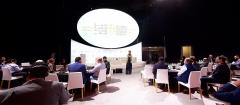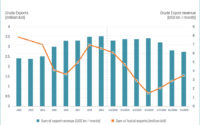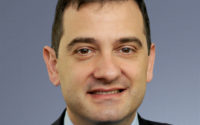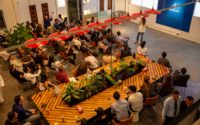GlES 2018 Puts The Spotlight On Islamic Philanthropy, Skills For Surviving The Fourth Industrial Revolution
The growing significance of Islamic philanthropy and creative skills needed to survive the Fourth Industrial Revolution were two key topics discussed by industry experts on the first day of the Global Islamic Economy Summit 2018 (GIES) in Dubai.
GIES 2018, the world’s largest summit dedicated to all aspects of the Islamic economy, is being held on October 301st-30th and gathering over 3,000 key decision makers, policymakers, government officials, business leaders and industry experts from around the world to discuss opportunities and challenges in the global Islamic economy.
The first parallel session at GIES 2018, entitled Islamic Philanthropy: The Problem Eradication Philosophy, was joined by Houssam Chahine, Head of Private Sector Partnerships, UNHCR, UAE; Dr. Tariq Cheema, CEO, WCMP, USA; Kimberly Gire, Founder, Global Women Leaders Strategic Philanthropy, USA and Rachid Ouaich, Co-founder, Conexcap, Luxembourg, who discussed how technology and global cooperation could be used to not only alleviate, but eradicate economic and social challenges and problems in the Muslim world.
“The UNHCR has created a state-of-the-art digital platform for Muslims to fulfill their Zakat obligations, giving them the chance to make a positive difference to the lives of the most vulnerable displaced communities. Our Zakat platform has revolutionised the way Zakat is distributed to eligible refugee beneficiaries; it facilitates online donations through a seamless automated process ensuring funds are allocated to the neediest families in the most transparent and efficient manner. More importantly, this allows refugees a dignified way of receiving aid on a monthly basis through advanced IRIS scanning technologies, without having to stand in queues and remember PIN codes,” said Houssam Chahine.
Speaking about the role of his organisation, Dr. Tariq Cheema said: “Our main aim is to make Muslim giving more effective and accountable. From spontaneous giving to more strategic giving, not just spending our charitable giving towards firefighting, but actually investing in the people and gradually taking them out of the state of dependency.”
Running alongside this discussion was another parallel session New Skills for the Creative Class in the Fourth Industrial Revolution, which outlined how the future of work will increasingly rely on people who combine creative, technical and social skills. Joining the discussion were Thomas Steele-Maley, Director of Foresight Research and Design, GEMS Education; Reem Hantoush, Associate, Department of Urban Planning, Abu Dhabi Municipality; Siddiqa Juma, Contemporary Islamic Artist, UAE and Arfah Farouq, Creative Business Strategist, Reluctantly Brave, UK.
“The mind is a very funny thing, but the idea is to teach ourselves and store the information in a box in our mind and then put it to use when creating anything. Unlocking the visual database of what we observe will help build creativity,” said Siddiqa Juma.
“The UAE has a big, ambitious education agenda. To make education and training flexible, we need to introduce the video-gaming style to learning and focus on reforming the whole education system,” said Reem Hantoush, speaking about how she sees the technology revolution shifting the nature of the work force.
Held under the patronage of His Highness Sheikh Mohammed bin Rashid Al Maktoum, Vice President and Prime Minister of the UAE and Ruler of Dubai, GIES 2018 is organised by Dubai Chamber of Commerce and Industry and the Dubai Islamic Economy Development Centre in cooperation with Thomson Reuters as a Strategic Partner.








